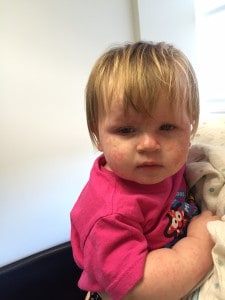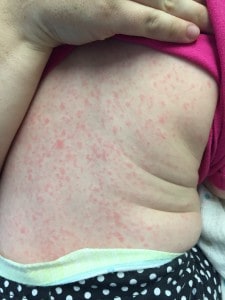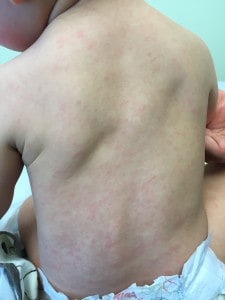What Does The Roseola Rash Look Like?
It’s that time of year again, when viral illnesses come out in droves and our kids get virus after virus – and bring them home to us too! This past week has been crazy in the office with roseola, a viral infection that causes high fever and rash, and terrifies worried parents.
Roseola, also known as sixth disease, is a viral illness that commonly affects kids age 6 months to 2 years, though some older kids get it as well.
What does the roseola rash look like?
Roseola infections typically begins with high fever lasting 3-5 days, followed by a distinctive rash as the fever breaks. High temperature in children can be very scary, but in this case, it is not usually dangerous and resolves on it’s own.
It is usually marked by several days of high fever, followed by a distinctive rash just as the fever breaks. What is a high fever? A fever is any temperature above 38 degrees Celcius or 100.4 degrees Fahrenheit. Most children with roseola develop cold-like symptoms with runny nose and congestion, followed by high fever. Irritability and decreased appetite are typical. The high fever often ends upruptly and a pink-red flat, blotchy rah appears on the trunk, sometimes spreading to the neck, face, arms and legs.
What causes roseola?
Roseola is caused by a virus that is very contagious. The infection spreads through droplets that others breath in after a child with roseola coughs, talks or sneezes. The droplets can also land on objects and if your child touches those objects, can get infected.
What can I do?
There is no treatment for roseola specifically. It will go away on it’s own. For the fever, use Acetaminophen or Ibuprofen products. The rash requires no cream or ointment, and will fade away on it’s own. It is not itchy or painful, and your child likely does not know he or she has it. To prevent dehydration, please ensure your child drinks small amounts of water, electrolyte solution, breast milk or formula, often. See your doctor is you are concerned about your child’s hydration.
Learn how to reduce a fever.
Worried your child has symptoms of pneumonia?
Does your child have a stye in eye?
What’s the best medicine for sore throat?
Dina is a wife, mother of 4, and adrenaline junky. She loves to share children’s health information from her professional and personal experience. More About Dr Dina.













